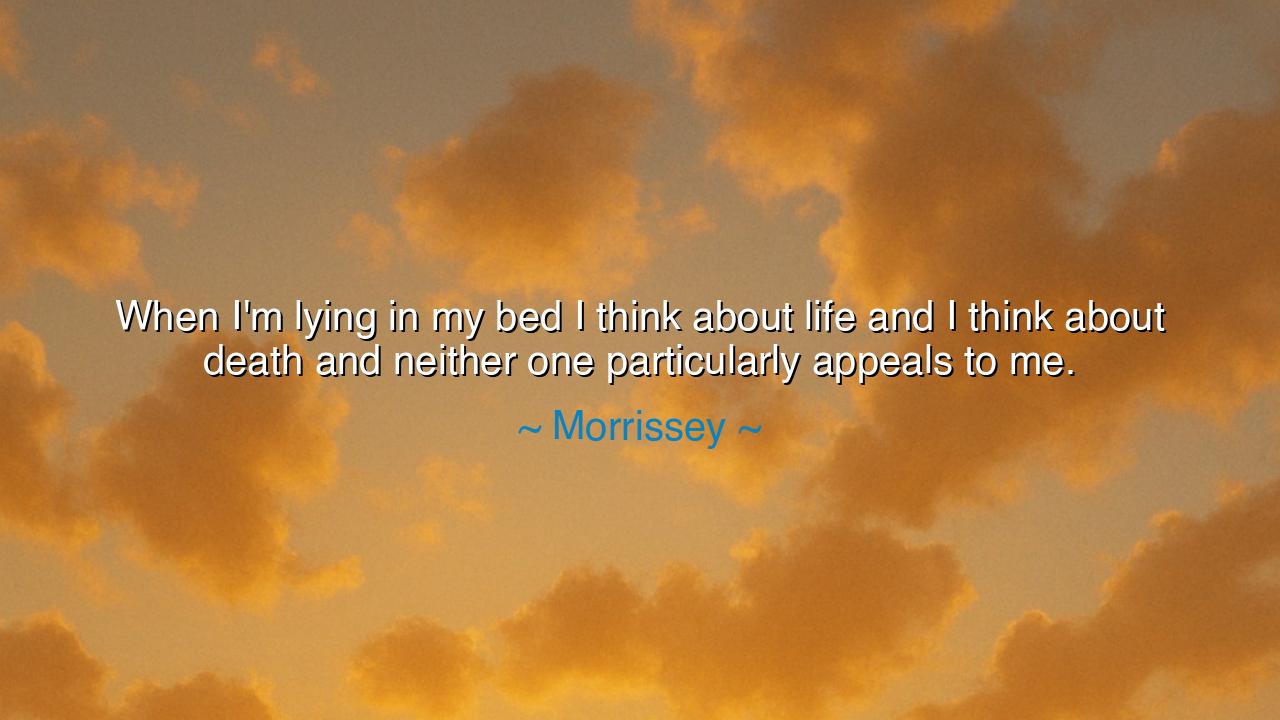
When I'm lying in my bed I think about life and I think about
When I'm lying in my bed I think about life and I think about death and neither one particularly appeals to me.






“When I'm lying in my bed I think about life and I think about death and neither one particularly appeals to me.” — thus spoke Morrissey, the melancholic bard of the modern age, whose voice, though born in song, often trembles with the weight of philosophy. In this haunting confession lies the essence of the existential condition, the timeless ache of being human: to find oneself suspended between life, which wounds, and death, which silences. Morrissey’s words are neither a cry of despair nor a hymn of nihilism — they are the sigh of one who has looked upon the world with clear eyes and found it both beautiful and unbearable.
This sentiment was born in the heart of postmodern solitude, in an age where abundance does not guarantee meaning. Morrissey, the frontman of The Smiths, became the voice of those who felt alienated even amidst company, who found in the modern world a strange emptiness — the crowd without communion, the noise without purpose. When he says that neither life nor death appeals to him, he speaks for those who live between two great hungers: the hunger for purpose and the hunger for peace. Life offers struggle without certainty, while death offers silence without return. Between these two abysses, the soul trembles — and sings.
The ancients, too, knew this feeling well. The philosopher Epicurus taught that the fear of death was the root of all anxiety, and yet he also warned that living in constant striving robs us of serenity. The Stoics, like Marcus Aurelius, meditated on death daily not to escape life, but to accept it. Yet even these great minds confessed the heaviness of existence — the burden of consciousness, the weariness that comes from knowing both the beauty and the futility of human effort. Morrissey’s lament, stripped of poetic disguise, echoes this same eternal truth: that to be human is to dwell between longing and resignation, between the light that dazzles and the darkness that comforts.
There is a story told of Buddha, who, before attaining enlightenment, left his palace and encountered sickness, old age, and death for the first time. The revelation shattered his illusion of happiness. He too saw that life was filled with suffering, yet death offered no true refuge. From that despair, he sought a path not between life and death, but beyond attachment to both — a way of being that embraces existence without clinging to it, and faces death without fear. Morrissey’s reflection, though born of modern disillusionment, touches the same timeless chord. It is the voice of the soul yearning for meaning when neither pleasure nor oblivion can satisfy.
When Morrissey sings or speaks of death, it is never mere morbidity. It is the honest confession of one who feels too deeply — one who cannot lie about the contradictions of existence. He reminds us that beauty and sorrow are inseparable twins, that laughter and despair often share the same breath. His words reveal that to feel alienated from both life and death is not a sign of weakness, but of sensitivity — of seeing the world too clearly to be comforted by illusions. For there are moments in every human life when neither hope nor escape can console, when one must sit in the stillness between being and nothingness and simply endure.
And yet, there is wisdom hidden within this melancholy. To admit that neither life nor death “appeals” is to admit that the soul still seeks — that there remains in us a spark of awareness that refuses to surrender to indifference. Morrissey’s voice, though weary, does not fall silent. He continues to sing, to create, to bear witness. In this way, he embodies the ancient hero’s paradox — the courage to persist even when meaning fades. As the Stoics said, “The obstacle is the way”; as the poets knew, even sorrow can be a form of grace. The very act of reflection — of lying in bed and thinking deeply about existence — is itself the soul’s refusal to be conquered by emptiness.
Therefore, O listener of tomorrow, take this teaching to heart: do not fear the heaviness of thought, nor the silence that comes when both life and death seem hollow. In those moments of stillness, you are closest to truth. Let the ache of existence refine your compassion; let the knowledge of mortality sharpen your joy. When life does not appeal, live anyway — not for pleasure, but for presence. When death tempts with its quiet, resist not out of fear, but out of reverence for the mystery still unfolding. For as Morrissey reminds us, to be caught between life and death is not a curse — it is the mark of the soul awake.






AAdministratorAdministrator
Welcome, honored guests. Please leave a comment, we will respond soon